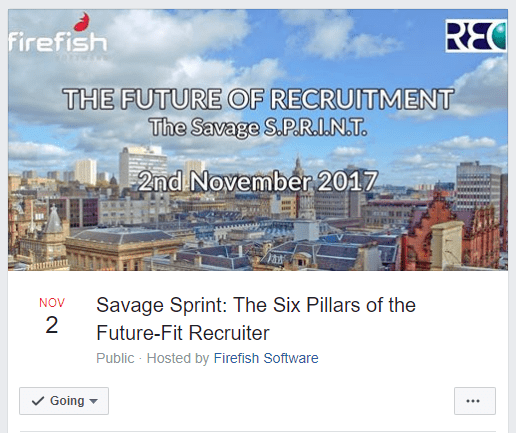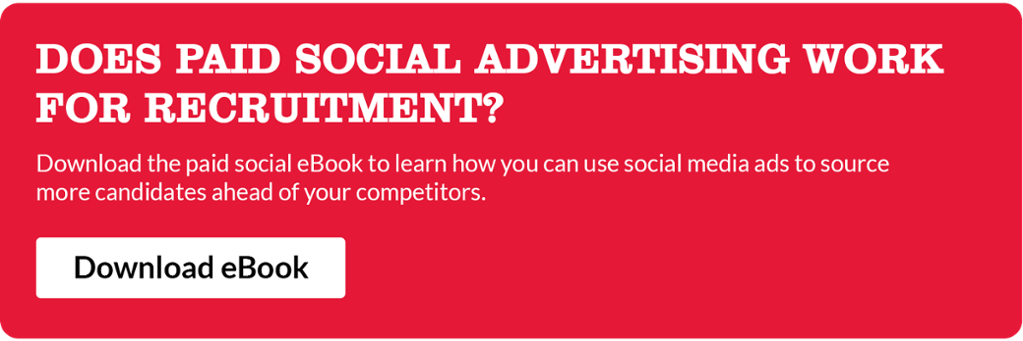Whether you’re organising a job fair, a networking event or a round-table session with an industry leader, you need to get the word out to promote interest in your recruitment event amongst the right people. And social media is the perfect way to do this – provided you know the tricks!
 Before we get started, it’s worth mentioning that you need to allow yourself ample time to promote your event - almost half of event organisers say it's best to give an event around three months to build momentum in the lead up to the day.
Before we get started, it’s worth mentioning that you need to allow yourself ample time to promote your event - almost half of event organisers say it's best to give an event around three months to build momentum in the lead up to the day.
So how do you get started in creating some hype around your recruitment events? Here's our go-to plan of action.
Create an event hashtag
First thing’s first – you want to rustle up a short, snappy hashtag for your event and use it in all social messages in the lead up to the day.
Bonus tip: always check that your chosen hashtag hasn’t been used for something else, and can’t be misconstrued, before you leap in and start plastering it across the internet!
You’ll also want to be using it in other promotional material outside of social media – for example in email marketing – as this will encourage association so people think to use your hashtag when they do go to post about it on social media.
Once you’ve launched your event hashtag, it will give your attendees (and your branded accounts) a way of keeping the conversation flowing in a connected way that’s easy to keep tabs of. For example, on Twitter if you search #FutureOfRecruitment, you’ll find lots of different people discussing the future of recruitment more generally, but if you search #FutureOfRec you’ll see discussion around Firefish Crowdcasts and live events.
Create a banner image
An on-brand banner image is a key component of your recruitment event marketing strategy, as this will be the image that appears as the header for your events and tickets pages and will be pulled through as the main image for your social media messages – so it should be both eye-catching and memorable.
If you’re worried that you’re a bit more MS Paint than Picasso, don’t worry! There are loads of easy-to-use free design tools to try (our favourite, Canva has a banner-making tool) that will help you create a banner image for your event. Remember to check the size of image you need for before you begin (for example, Eventbrite requires 2160 x 1080px and Facebook event pages need 1920×1080px).
You might be tempted to cram as much information into your image as possible, but try to hold back. Too many details on your event image will only distract viewers, and Facebook even penalises event banners that are too text-heavy.
Ideally, an event banner should tell people the following:
- Who is hosting the event (your logo is enough)
- What the event is
- Where and when it’s happening.
Whatever background image you choose, check that it displays well across different devices: There’s been a 50% increase in the use of smartphones to purchase event tickets in recent years, so you need to ensure your banner images still look good when it appears on smaller screens.
Here's an example of a banner we used for an event last year:

Create a Facebook event page
Creating an event page on Facebook is quick and straightforward, so you should be creating one for every event you do, no matter how big or small you’re expecting the event to be (you can also create invite-only event pages if you’re worried about numbers getting out of hand).
Creating a public event will instantly notify followers of your business page, bringing you in some good initial traffic. Once your event page is created, you can run paid ads on Facebook to promote the event (more on that later!).
Promoting an internal Facebook event page will be shown to more Facebook users than a link to your website or a ticketing service would be, because Facebook prioritises content that keeps users on the platform.
Another perk of Facebook event pages is that you can integrate it with Eventbrite, allowing people to buy tickets directly from your Facebook event page if the event is ticketed.
On Facebook, when someone clicks the 'attending' or 'interested' button on your event page, the page will show up in their Facebook friends’ feeds too. So, it’s in your interest to entice candidates to click that button!
Another way to encourage activity on your events page so it appears in more attendee friends’ feeds is to share interesting (and relevant) content – for example, blogs posts written by an event speaker or job market insights prior to a job fair.
Encouraging event page activity works well for two reasons: Firstly, viewers of your event page are more likely to engage/attend if they can see there’s value in what you’re sharing. And secondly, if you’ve crafted your content correctly, attendees will want to share it, and this will increase the reach of your event without costing a penny! Free marketing!
Consider putting together a short video from a past event to share on the event page to illustrate what attendees can expect – you don’t need a large budget for this either. Here's an example of one of ours below:
Bonus tip: When posting updates on your event page, creating a sense of urgency can work well in converting ticket sales: Use countdowns to the day to encourage followers to buy tickets, and post snippets of the event content using your hashtag to entice interest.
Update your social media profiles
Now that you have the key components of your recruitment event marketing covered, it’s time to update your profiles (Facebook, LinkedIn, Twitter and Instagram too). Update your cover photo to your event banner and mention the key event details in your social media profile bios.
Don’t forget to include your event hashtag and a link to a ticket page if you have one.
Recognise your biggest marketers
When marketing your recruitment event, think about what the key draws for attendees are: Is it an influential speaker from the recruitment industry? A keynote topic that many recruiters struggle with? A big brand attending a job fair that candidates will be desperate to work for?
Whatever (or whoever) the attendee pull is, leverage their social media power and following to attract even more attention to your event. Identify attendees who have a large, relevant social media following – these people can be key marketers for your event.
Incentivise them to post about the event by offering ticket upgrades, a free drink or perhaps an additional ticket to take a friend. Alternatively, identify an influencer with a large following to come along for free (if the event is ticketed of course!) in exchange for a few social media posts.
If you have an industry influencer speaking at your recruitment event, they should be more than happy to help promote it (the more attendees present, the better it looks for them!). However, chances are your speakers are busy people, so make it easy as possible for them to promote the event by sending them pre-written statuses and tweets to simply copy and paste - they'll appreciate it if you make it as easy as possible for them.
Run a paid social media campaign
%20Every%20Social%20Media%20Site.png?width=300&name=The%20Best%20Header%20Sizes%20for%20(Nearly)%20Every%20Social%20Media%20Site.png) Your next step in getting the word out about your recruitment event would be to dedicate a small budget to running some paid ads on your social media platforms. Social media advertising is really a powerful tool to gathering more attendees to your recruitment events, as you’re able to target your messages specifically to those who work in the recruitment sector or have an interest specifically in the topic of your event.
Your next step in getting the word out about your recruitment event would be to dedicate a small budget to running some paid ads on your social media platforms. Social media advertising is really a powerful tool to gathering more attendees to your recruitment events, as you’re able to target your messages specifically to those who work in the recruitment sector or have an interest specifically in the topic of your event.
For live events, location is obviously an important factor, too. By running a paid advert on social, you’ll be able to target users living within travelling distance of the event venue, which will give you a much better chance of converting traffic into ticket sales.
…and retarget anyone who doesn’t convert!
Have you ever been shopping online for a particular brand, abandoned your cart without making a purchase because you got distracted, only to find that you’re seeing adverts for that brand pop up left, right and centre on social media? This is not a coincidence!
This is a social media advertising strategy called ‘retargeting’ and you can use it when marketing your recruitment event too. To get started, you install a pixel on your ticket page to trace who visits the page (find out how to install the Facebook and LinkedIn pixels here), and create adverts that will pop up on those people’s social media feeds in attempt to bring them back to your event.
As the event draws near, you could even run retargeting ads with a special promotion – money off the ticket price, or a free CV consultation. This is an easy way to give you a second chance at an audience that are already interested in your event.
If you’d like to dive into some of the social media advertising strategies we’ve suggested in this blog, but are a bit unsure where to start, download the eBook below and we’ll show you how to get the best out of your paid social campaigns.
Christine Stark
Christine is a Digital Marketer with experience managing communications across a variety of sectors. She loves caffeine, cosy jumpers and cocktails.



